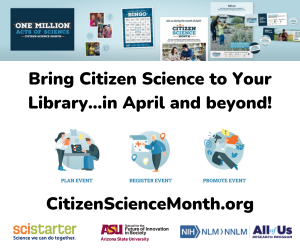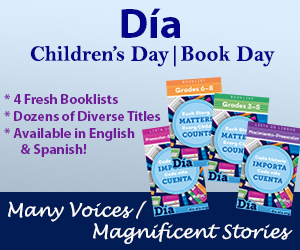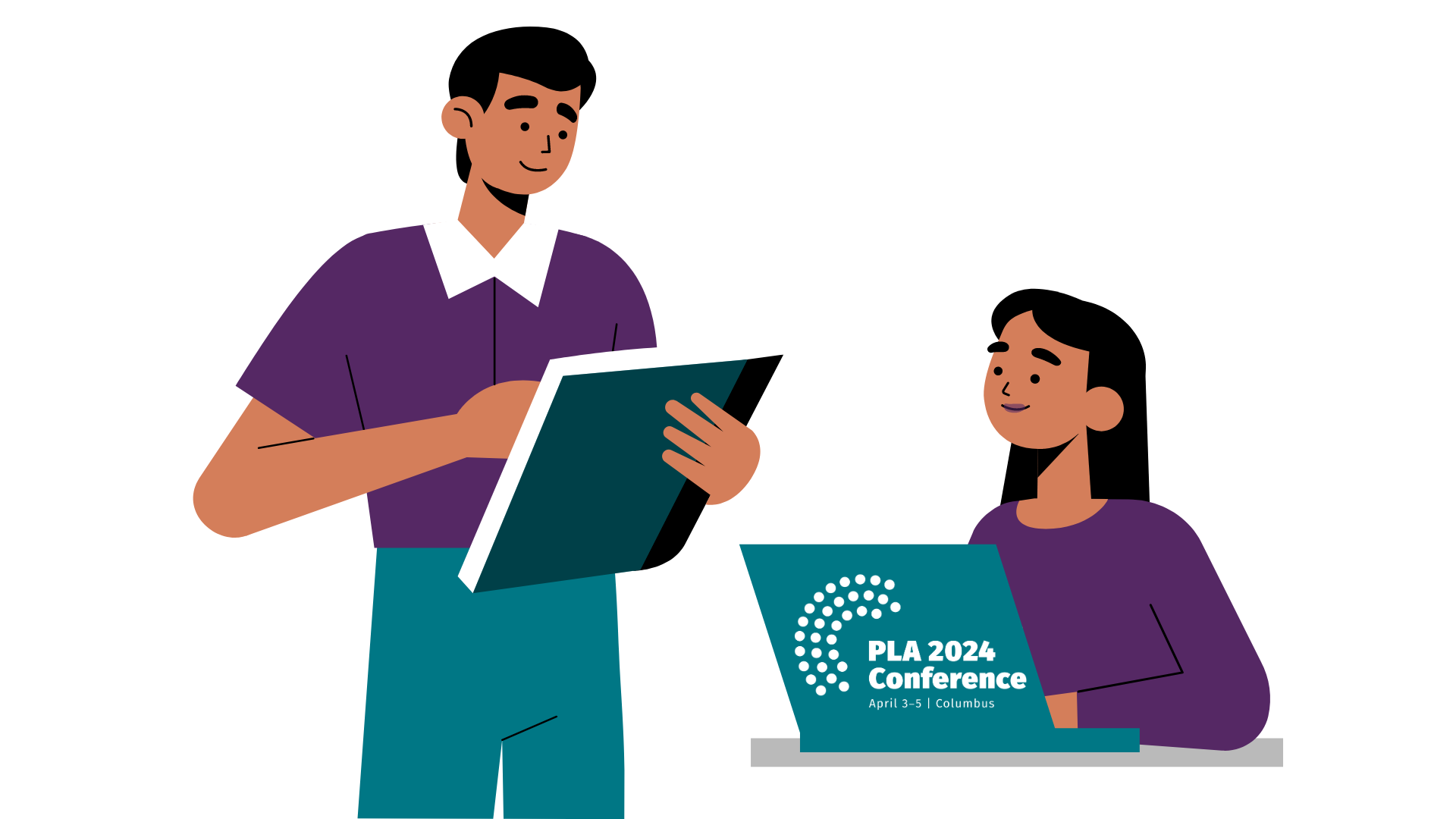Reaching for Memories: Expanding Services and Programming to Patrons Living with Alzheimer’s Disease
David J. Kelsey is Outreach Services Librarian at St. Charles (IL) Public Library. Contact David at dkelsey@stcharleslibrary.org. David is currently reading The Rules of Magic by Alice Hoffman.
Alzheimer’s disease has personally affected millions of Americans and their families. Someone you know has likely suffered from Alzheimer’s disease or will in the future. Whether having served as a caretaker, provided monetary support, or offered comfort and guidance to those in need, your life will be touched by Alzheimer’s. Libraries are uniquely able to provide essential support and services to patrons living with memory loss and their caretakers.
RAILS Serving Patrons with Dementia Group
In 2016, Tina Williams of the White Oak (IL) Library District and I began speaking to libraries about serving patrons with dementia. Following the 2015 National Conference of the Association of Bookmobile and Outreach Services (ABOS) held in St. Charles (IL), Mary Beth Riedner, guest speaker and chair of the American Library Association’s (ALA) Alzheimer’s and Related Dementias Interest Group (IGARD), approached Williams and me about launching a library system–wide networking group in Northern Illinois focusing on serving patrons with dementia and their caretakers.1
Together, Williams and I formed the Reaching Across Illinois Library System’s (RAILS) Serving Patrons with Dementia Group, the first group of its kind in the United States and IGARD’s best practice model for future dementia networking groups.2 We meet four times a year, including two “Efforts in Action” meetings, where local libraries showcase innovative practices used to serve patrons with dementia in their communities. During meetings we discuss programming and marketing ideas and ways to partner with community organizations. We share inspiring stories and what has and has not worked in reaching this underserved population. Williams and I later developed a blog, to share resources we have collected from other librarians working with this demographic.3
Alzheimer’s Disease
The Alzheimer’s Association reports the following staggering statistics about how Alzheimer’s disease directly affects millions of Americans. More than five million Americans currently live with Alzheimer’s disease. This number could boom as high as sixteen million in 2050. One American develops Alzheimer’s every sixty-six seconds. In addition, fifteen million Americans provided 18.2 billion hours of unpaid care to individuals with dementia valued at $230 billion of medical service. One in three seniors dies from the disease.4 As the numbers continue to rise, librarians need to ask themselves (1) How does this growing demographic affect my library and community? (2) What library services and programming can we provide to target this population? and (3) What community organizations can we partner with to better serve patrons living with the disease?
Programming for Patrons Living with Memory Loss
Library programming at care and memory facilities can have a positive effect in the lives of individuals living with Alzheimer’s disease. Libraries can develop and schedule new and inventive programs that work for their library, community, budget, and available staff time. Librarians can present programs to patrons individually or in group settings, depending on the senior facility’s needs. Utilize volunteers and staff from all library departments to encourage additional engagement and conversations with residents.
Showing you care and making personal connections is essential when working with individuals living with memory loss. Have fun and be creative. Take your time and get to know patrons on a first-name basis. Incorporate art programs, engagement kits, or other hands-on activities to stimulate different senses. Enhance programs by using technology; consider playing DVDs or YouTube clips of old-time movies and singers from the 1940s and 1950s, such as Shirley Temple and Kate Smith.
Do not get discouraged if something does not work or you do not get the response you were anticipating. Try something new and keep trying. You do not always realize you have made a difference, but you have. You make a difference just by being there.
Tales and Travel Memories
Developed by Mary Beth Riedner, Tales and Travel Memories involves taking patrons on imaginary journeys to evoke memories of other lands. The program is presented at care and memory facilities. Facts, folklore, souvenirs, props, music, ethnic spices, and world globes are incorporated into the presentations. The best part of Tales and Travel Memories are the interactions and conversations staff have with patrons, some who remember their own travels abroad. Visit Dominican University’s website to learn more about Tales and Travel Memories and watch an informative video to see the program in action.5 Find programs on the Tales and Travel Memories website ready for any library to use.6
Memory Kits
Libraries around the country use memory kit activities designed for patrons living with memory loss. You might have heard of BiFolkal Kits, which incorporate props, handouts, music, singalong activities, and skits. Libraries may also develop kits to use with patrons at senior facilities. The St. Charles Public Library District (SCPLD) created eight Educational and Engagement Kits around specific themes such as movie stars, cooking, the holidays, and comedians. Each kit includes an informational booklet with facts, background history, and photos, along with small objects patrons may hold and examine. For example, our “Remembering Comedians” kit features comedians from the 1930s-60s and contains funny glasses, clown noses, a bicycle horn, and a ventriloquist’s dummy.
Kits for Caregivers
Supporting caregivers is as important as supporting the individuals with dementia. Some libraries have caregiver kiosks featuring information, handouts, and brochures on caregiving, aging, Alzheimer’s disease, and dementia. The Caregiver Kiosk at SCPLD features our ten caregiver kits, which contain DVDs, CDs, and coffee table books. The themed kits are meant to be an enjoyable reminiscence activity for caregivers to use with someone who has memory loss. Our “Laughing with Lucy” kit features two seasons of I Love Lucy, a Desi Arnaz soundtrack, and a coffee table book highlighting classic I Love Lucy moments.
Memorable Pets
Libraries can purchase Memorable Pets to engage patrons living with Alzheimer’s. Developed with input from geriatric specialists, Memorable Pets’ stuffed animals provide loving comfort, a sense of security and purpose, and are therapeutic tools for nurturing and play. Patrons often request we bring our Memorable Pets on every facility visit as they remind them of pets they once had. SCPLD recently incorporated our Memorable Pets into a program featuring actress and animal rights activist Betty White. As patrons embraced each pet, they were encouraged to name it.
Therapy Animals
Animals often forge special connections with people who have dementia. You might have seen resident pets at local care facilities. Facilities work with local therapy animal organizations or hire pet coordinators. Libraries can partner with therapy animal organizations and incorporate animals into programs. SCPLD arranged for a therapy dog to visit fifty residents at a care center, both in a large group and individual room visits. Residents had an enjoyable experience petting and learning about the dog, as well as reminiscing about former pets.
Music Programs
Libraries can feature music programs for individuals with dementia, including concerts and singalongs. SCPLD hosts an annual holiday singalong at two assisted living facilities. Library staff and their families volunteer to participate and residents are encouraged to join in ringing jingle bells. Libraries could partner with local churches or schools to provide music programs at facilities as well.
SCPLD recently launched the program series “I’ve Got Rhythm” featuring musical instruments for patrons to play, including the egg shaker, guiro, maracas, and bongo drums. This is a great method to stimulate multiple senses and encourage the use of fine motor skills. When we debuted the bongo drums at a care center, a gentleman was inspired to play “Babalu,” the classic Desi Arnaz song from I Love Lucy.
Reading Programs
Reading to individuals with memory loss is an effective way to encourage engagement and conversation. SCPLD Outreach staff brings “Reading to Residents” to care facilities. We read to individuals, or to small groups. Residents always enjoy books and short stories featuring animals. Outreach Assistant Dana Hintz presented a reading program, where she believed a gentleman in attendance was sleeping. When Dana was finished, the gentleman turned to her and said, “I really loved that story with the dog, Mittens.” Experiences like this illustrate that we are truly making a difference in our patrons’ lives and inspire us to continue our work.
TimeSlips
Storytelling and using the imagination help encourage and foster memories, including life experiences and events. During a TimeSlips program, library staff pass out pictures and images to patrons featuring people, nature, or the weather. Residents create a story about the picture: the individual’s name, what they are wearing, or why it is raining outside. Library staff write down the conversation and repeat the story to residents. You will be surprised at your patron’s storytelling abilities.
TimeSlips offers training to librarians interested in using their program, and free pictures are available on the TimeSlips website. Informative and helpful videos demonstrating the program in action are also available online.
Incorporating Vintage and Antique Items
Collect vintage and antique items to incorporate into facility programming. These items inspire memories and integrate new senses. SCPLD developed the “Attic” Memory Wagon. We feature new “Attic” programs every month revolving around three themes: fashion, household appliances and products, and travel in the USA. Recent “Attic” programs include Howard Johnson’s and Pan American Airlines. We purchase items from antique and thrift stores, the flea market, and Etsy. Favorite patron comments during “Attic” programs include, “This takes me to way back when,” “These bring back great memories,” and, “I used to wear something just like that.” A fond memory was when three ladies modeled a blue pillbox hat, a style made famous by First Lady Jackie Kennedy in the 1960s.
Working with the Alzheimer’s Association
The Alzheimer’s Association (www.alz.org) has local chapters across the United States and offers programs to libraries and community organizations. Contact your local chapter to see the programs that they can provide, including information for caregivers and understanding the warning signs of the onset of the disease. The Alzheimer’s Association offers a 24/7 helpline and free webinars. They distribute free literature and brochures, which libraries can keep on file or house in caregiver kiosks.
Collaborating with Community Organizations
If you have ideas to provide services or programs to patrons with dementia, but do not have the necessary resources, consider collaborating with community civic organizations. Churches, the Lions Club, Kiwanis Club, Scouts, or other civic organizations are always searching for community outreach projects to support. Partner with your Friends or Foundation groups or ask library volunteers for assistance.
SCPLD recently launched the community-wide “fidget quilt project,” partnering with area churches, community volunteers, and library staff to construct fidget quilts and aprons for patrons with memory loss. Fidget quilts feature bells, buckles, buttons, ribbons, zippers, and manipulative items to relieve the stress associated with Alzheimer’s and engage fine motor skills. We collected fifty quilts and delivered them to local memory facilities during the holidays.
A Few Tips from the Trenches
Regardless of your library’s location, you will encounter patrons living with Alzheimer’s. Remember to treat these patrons with respect, courtesy, and kindness, just as you would any patron. Here are some tips I have found to be useful when working with this population.
- Always have facility staff members present while providing programming at senior facilities. This is for the safety of residents and library staff. Library staff should never act as nursing or caregiver staff.
- If a patron with memory loss regularly visits the library’s service desk and repeatedly asks staff similar questions, have on file the answers to those questions.
- If a patron with dementia visits the library and becomes lost or disruptive, take the patron to a quiet area, sit and talk with them, and encourage them to relax and focus. Discuss general topics such as the weather or something they are wearing.
- Though patrons with memory loss might not be able to read anymore, the experience of holding physical books can be comforting. House a collection of donated or discarded books that homebound patrons can keep and do not need to be returned. Provide a bookshelf or bookcase at local memory facilities where patrons can browse and help themselves.
- Lastly, any effort you make to serve patrons with dementia, no matter how big or how small, makes a difference in their lives and for your community.
An Alzheimer’s disease diagnosis is both frightening and life changing. What memories will be retained? What will be lost? Through programming, library services, and partnering with the Alzheimer’s Association and local civic organizations, libraries can make significant contributions to serve this population and their caregivers. Dementia will touch us all at some time. Let us as librarians do our part to help support, comfort, entertain, and educate wherever and however we may.
References
- Association of Specialized and Cooperative Library Agencies, Alzheimer’s and Related Dementias Interest Group, accessed Aug. 17, 2018.
- Reaching Across Illinois Library System, Serving Patrons with Dementia Group, accessed Aug. 17, 2018.
- Serving Patrons with Dementia Group, accessed Aug. 17, 2018.
- “2017 Alzheimer’s Disease Facts and Figures,” Alzheimer’s Association, accessed Aug. 22, 2018.
- Dominican University website, “Tales and Travel Memories,” accessed Aug. 17, 2018.
- Tales and Travel Memories website, accessed Aug. 17, 2018.
Tags: Alzheimer's disease, library services and resources for patrons with alzheimers







